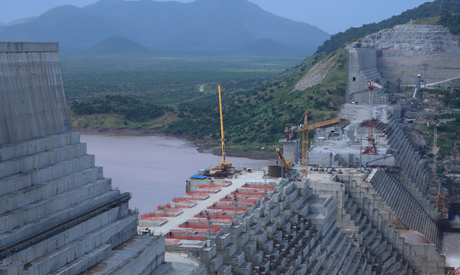Date: Monday, 15 February 2021

"The United State believes that there is a possible negotiated solution between the [three] countries akin to [the treaties reached] between the United State and [both] Mexico and Canada on the water and rivers," Samuel Warburg, the Regional Spokesman for the US State Department, said in a TV comment with Mehwar Egyptian TV channel.
Warburg's comments on Saturday were the first public statement by a US official on the issue of the GERD dispute since President Joe Biden took office in late January.
In response to a question on what role the Biden administration could play in the long-running stalemate in the negotiations, Warburg said the new administration has first to "understand all details and results of all negotiations and the US efforts over the past years."
He also said the US expected the three countries would find a way out for the stalemate, adding that "from the years I have been in Egypt, I know how Egyptians consider Sudanese and Ethiopians brothers."
The spokesman added that the new administration is looking into the issue in a bid to find out whether there is a chance for the US to play a "positive" role, act as a mediator or coordinator in the talks, or offer technical assistance in this respect.
Under Trump administration, and per Cairo's request, Washington attempted to mediate a negotiated agreement between the three countries, but failed after Addis Ababa refused to sign on a draft deal.
The US Treasury Department and the World Bank hosted more than one round of tripartite talks from November 2019 until February 2020, before Ethiopia's withdrew from the last session of talks and refused to sign on any binding deal.
The US also acted later in the year as observer in African Union (AU) sponsored tripartite negotiations, but that effort also failed also due to Ethiopia's intransigence.
In November 2020, former US President Donald Trump lashed out publicly against Ethiopia for its withdrawal from the final round of the US-brokered negotiations earlier in the year, saying Cairo's concerns in the dispute are legitimate.
Egypt fears the project will significantly cut its crucial water supplies from the River Nile, while Sudan has concerns on how the reservoir will be managed.
Ethiopia says the massive project, which it hopes will make it Africa’s largest power exporter, is key to its development efforts.
Egypt has stressed on multiple occasions that it supports Ethiopia's development goals, but has insisted all along that a legally binding agreement between the three sides is the only acceptable way to end the dispute and safeguard its water rights.
However, Ethiopia has completed the first filling of the dam last summer, and announced plans to complete the second filing in July without waiting for a deal to be signed.